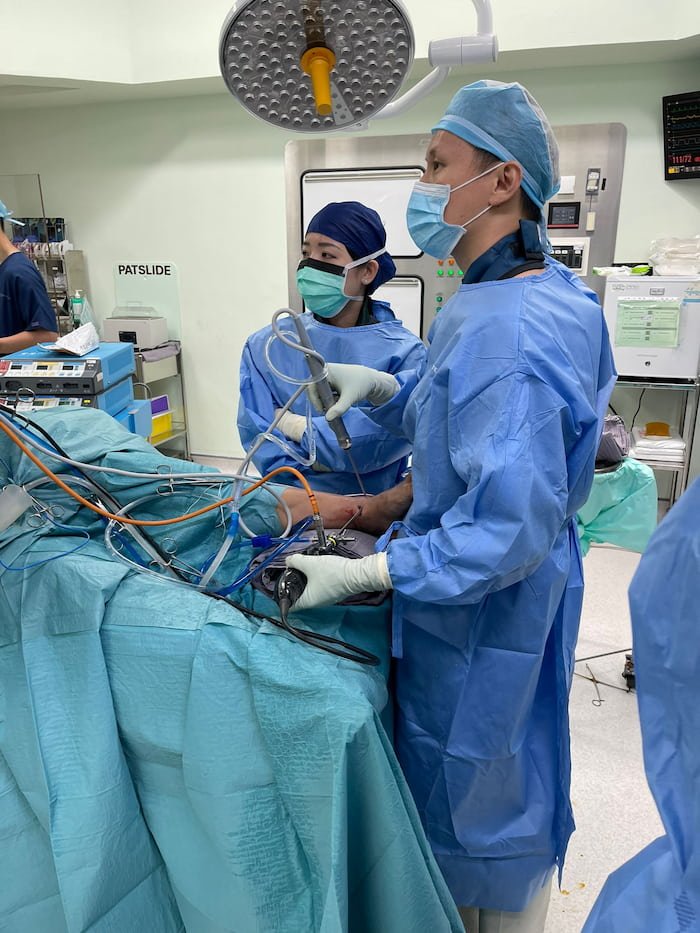
Restoring Function. Embracing Life.
Achilles Tendon Injury Specialist in Singapore
Dr Bryan Wang
Consultant Orthopaedic Surgeon
Trusted Orthopaedic Surgeon | Fellowship-trained in Canada | With over 20 years of experience
What is Achilles Tendon Injury?
An Achilles tendon injury is a condition that affects the Achilles tendon, which is the thick band of tissue connecting the calf muscles to the heel bone. It's one of the most commonly injured tendons in the body and can range from mild inflammation (tendinitis) to more severe injuries like tears or ruptures. Here's some information about Achilles tendon injuries.
Some of the causes of achilles tendon injury include:
Overuse or repetitive strain: Engaging in activities that involve jumping, running, or sudden acceleration and deceleration can lead to overuse injuries.
Tight calf muscles: Inadequate stretching can strain the Achilles tendon.
Sudden increase in activity level: Rapidly increasing the intensity or duration of exercise can stress the tendon.
Poor footwear: Wearing shoes without proper support or that don't fit well can contribute to injuries.
Aging: As people age, the Achilles tendon can become weaker and more prone to injury.
What are the Symptoms
Achilles tendon injuries can range from mild tendinitis to a partial or complete rupture. Symptoms depend on the severity of the injury but commonly include:
Pain and tenderness in the back of the ankle, especially during physical activity.
Swelling around the Achilles tendon.
Stiffness and limited range of motion in the ankle.
A popping or snapping sensation (for ruptures) during the injury, immediate difficulty walking or standing on the affected leg.
In severe cases, difficulty walking or standing on tiptoe. There might be bruising around heel or lower calf or visible deformity such as noticeable gap or indentation where the tendon has torn.
How to diagnose Achilles Tendon Injury?
Achilles tendonitis is inflammation of a tendon which is caused by the straining, or tearing of the tendon fibers. Clinical assessment will include taking a detailed history and a thorough examination of your ankle.
Further imaging tests like X-rays, MRI and CT scans may occasionally be required.
Achilles Tendon Injury Treatment
What are my Treatment options?
Treatment for achilles tendon injury at the foot and ankle depends on various factors, including the location and severity of the injury.
If you have any of the symptoms above, it is advisable to see an orthopaedic specialist for further assessment. The appropriate treatment is decided after assessment and a collaborative discussion based on your needs.
They can be broadly divided into conservative (non-surgical) and surgical options.
Conservative Treatment
Rest: Avoid activities that worsen the pain.
Ice: Applying ice to the affected area can help reduce pain and inflammation.
Compression: Using compression wraps or bands can aid in reducing swelling.
Elevation: Elevating the foot above heart level can help minimize swelling.
Physical therapy: Stretching and strengthening exercises can promote healing.
Orthotics or proper footwear: Supportive footwear and inserts can alleviate strain.
Medications: Nonsteroidal anti-inflammatory drugs (NSAIDs) may be used for pain relief and to reduce inflammation.
Surgical Treatment
Surgical treatment for an Achilles tendon injury is considered when the injury is severe, such as a complete tear or rupture, or if nonsurgical treatments have not provided sufficient improvement. Surgical intervention aims to reattach the torn or ruptured tendon ends, allowing for proper healing and restoration of function.
There are different surgical techniques for repairing the Achilles tendon, and the choice depends on factors like the location and severity of the injury, as well as the surgeon's expertise.
Common surgical approaches include open surgery and minimally invasive procedures.





